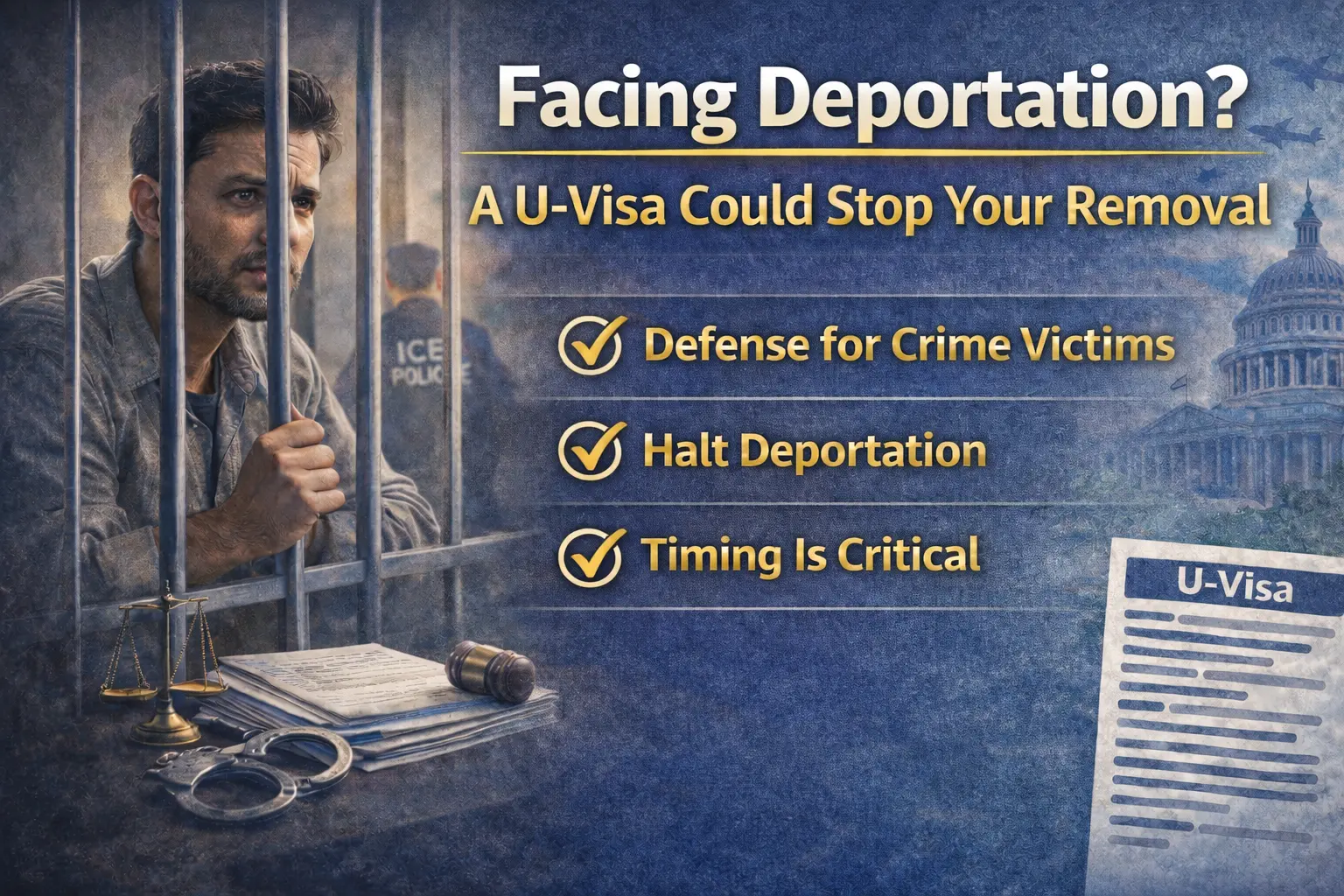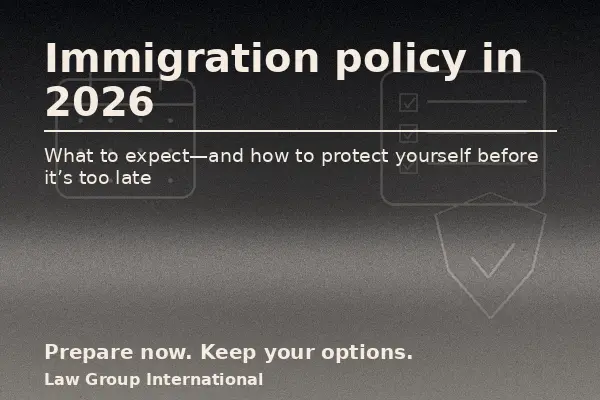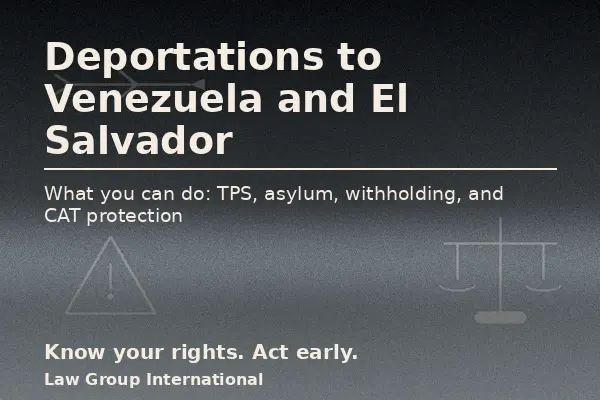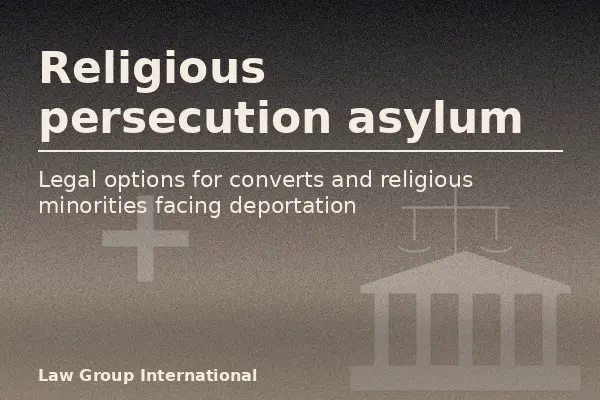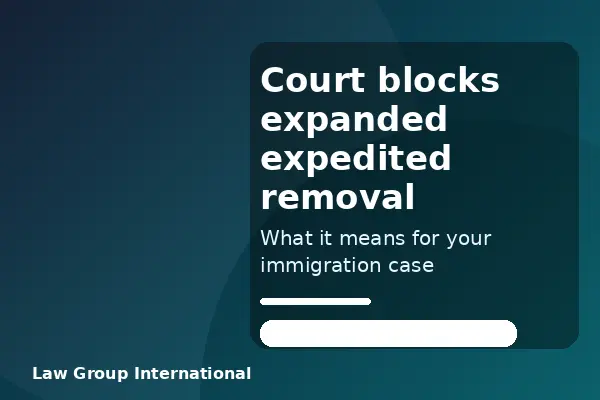Can You Get a Green Card While Facing Deportation?
Facing deportation is one of the most stressful experiences an immigrant can go through. The uncertainty, the court deadlines, and the possibility of being separated from your family can make it feel like everything is on the line. If you’re hoping to secure lawful permanent residency, you might be wondering: is it possible to get a green card during deportation proceedings?
The answer is yes, in certain situations. Your eligibility depends on your immigration history, the reason for deportation, and the legal strategies available in your case. With the right approach, you may be able to adjust your status, cancel your removal, or transition from another form of relief, such as asylum, into a green card.
At Law Group International, we’ve helped many clients in removal proceedings protect their right to stay in the U.S. and achieve their immigration goals. In this guide, we’ll explain the key pathways, evidence requirements, and steps you need to take.
Understanding Deportation Proceedings and Green Card Eligibility
Under U.S. immigration law, removal proceedings are the formal process where the government seeks to deport a noncitizen from the United States. These cases are heard by an immigration judge, and the rules are outlined in the EOIR Immigration Court Practice Manual.
If you are in removal proceedings, you can still apply for a green card, but only if you qualify for a form of relief that allows for adjustment of status or other lawful permanent residence pathways in court. Your application will be reviewed by the judge, not USCIS.
If you’re unsure where to start, visit our Deportation Defense page for more information.
Legal Pathways to a Green Card During Deportation
There are several possible legal strategies to secure a green card while in immigration court:
1. Adjustment of Status via Immediate Relative Petition
If you are the spouse, parent, or unmarried child under 21 of a U.S. citizen, you may be eligible for adjustment of status directly in court. This process allows you to remain in the U.S. while your case is pending. In many cases, an approved Form I-130 petition is required.
2. Cancellation of Removal
There are two types:
- For certain permanent residents: Must show at least 5 years of permanent residency, 7 years of continuous residence, and no aggravated felony convictions.
- For certain non-permanent residents: Must show 10 years of continuous presence, good moral character, and that your removal would cause “exceptional and extremely unusual hardship” to a qualifying U.S. citizen or permanent resident relative.
3. Asylum to Green Card Transition
If your asylum claim is approved in court, you can apply for a green card one year later. This applies even if you were initially in removal proceedings.
For more on family-based routes, see our Family-Based Immigration services.
The Role of Evidence and Legal Representation
Your case’s success depends heavily on the evidence you provide. This can include:
- Proof of a qualifying family relationship
- Documentation showing extreme hardship to relatives if you are deported
- Records proving good moral character
- Any other evidence that supports your eligibility
In some cases, you may need a waiver to overcome certain grounds of inadmissibility.
Having an experienced immigration lawyer is essential. We know how to present evidence effectively, meet court deadlines, and anticipate challenges, especially before the Board of Immigration Appeals if your case requires an appeal.
Common Mistakes to Avoid
Many applicants lose their chance at a green card because of avoidable errors, such as:
- Missing deadlines for filings or evidence submission
- Incomplete or inconsistent documentation
- Misunderstanding eligibility and applying for relief you don’t qualify for
Step-by-Step Guide for Applicants in Removal Proceedings
Step 1: Consult an experienced immigration attorney as soon as possible.
Step 2: Evaluate your eligibility for all possible forms of relief.
Step 3: Prepare and submit the necessary applications and evidence.
Step 4: Attend all immigration court hearings and comply with orders.
Step 5: Be ready to appeal if the judge denies your application.
FAQs – Green Card During Deportation Proceedings
Q1: Can I still apply for a green card if I’m in deportation proceedings?
Yes. In certain cases, you may apply for a green card while in removal proceedings, especially if you qualify for adjustment of status, cancellation of removal, or other relief.
Q2: What is adjustment of status in immigration court?
It’s the process of applying for permanent residency before an immigration judge instead of USCIS. It allows eligible applicants to stay in the U.S. while their case is reviewed.
Q3: Can asylum seekers in deportation proceedings get a green card?
Yes. If asylum is granted in court, you can apply for a green card one year later.
Q4: What evidence do I need?
Proof of family relationships, hardship documentation, evidence of good moral character, and other supporting records.
Q5: Should I hire an immigration lawyer?
Absolutely. Immigration court is complex, and mistakes can lead to removal. A lawyer can assess your case, prepare filings, and represent you effectively.
Other options to obtain a green card during deportation
It is possible to obtain a green card during deportation, but it requires careful planning, strong evidence, and the right legal strategy. With the guidance of Law Group International, you can explore every available option to protect your future in the U.S.
Our team has decades of combined experience defending clients in immigration court and helping them achieve lawful permanent residence despite removal proceedings.
Schedule a confidential case review today to protect your right to stay in the United States.
Explore More Immigration Topics
VAWA Immigration: Protection for Victims of Domestic Violence
January 28, 2026
U-Visa and Deportation: How This Visa Can Save Your Case
January 19, 2026
U-Visa requirements 2026: Complete eligibility guide
January 13, 2026
Immigration Policy in 2026
January 1, 2026
Deportations to Venezuela and El Salvador
December 31, 2025
Religious Persecution Asylum
December 30, 2025
Northern Virginia Immigration Court
December 20, 2025
Federal Court Blocks Expanded Rapid Deportations
December 16, 2025
What to Do If ICE Comes to Your Door
December 14, 2025


